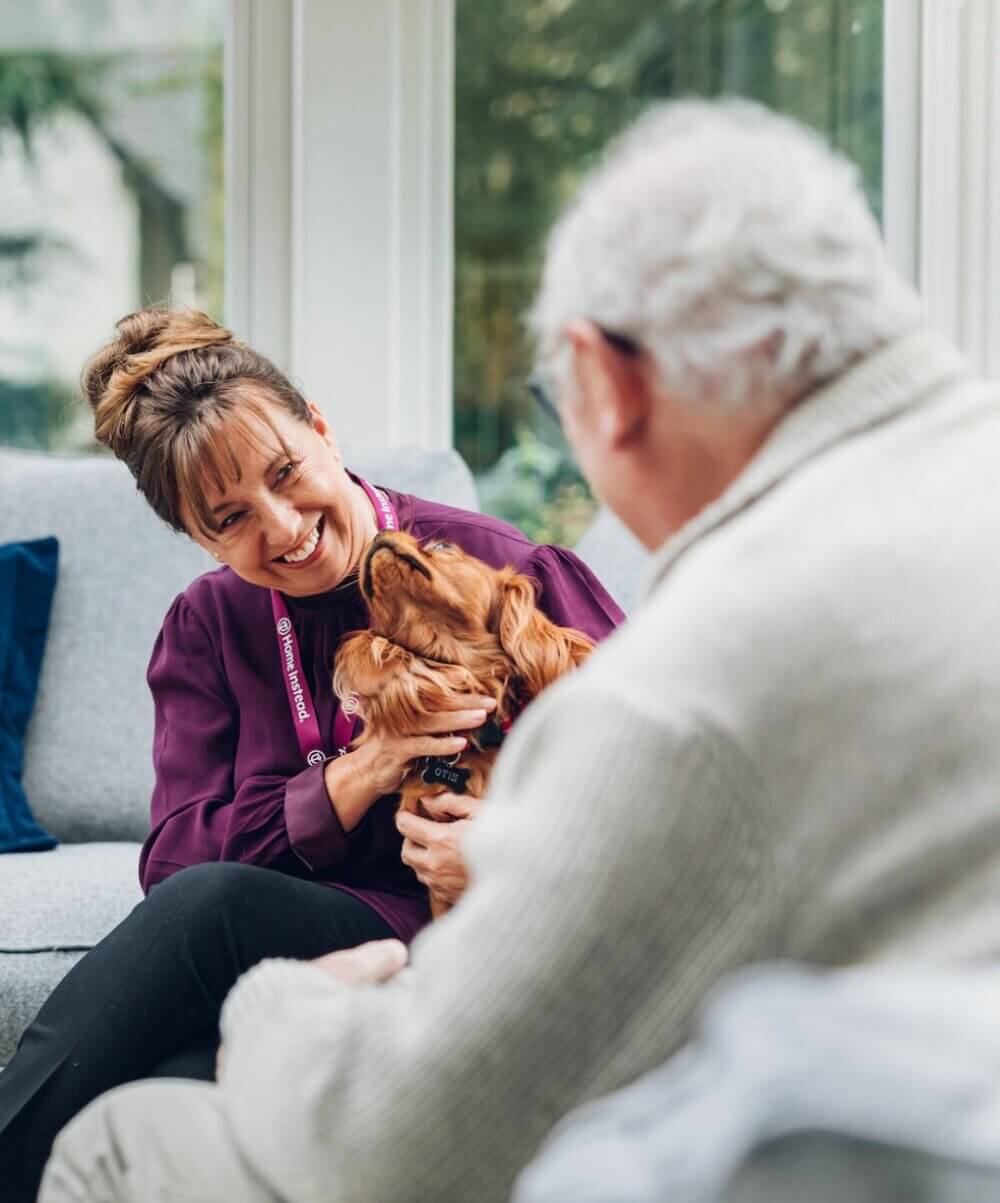Assistive Technology For Dementia Patients
Helpful technology designed to help dementia client’s effectively manage life at home, with expert support from Care Professionals who understand the complexity of life with dementia.
Assistive technology can play a vital role in supporting people living with dementia, helping them stay safe, independent, and engaged at home. From reminder devices to safety sensors, these tools make daily life easier while reducing stress for both patients and their families.

What do dementia clients struggle with?
Dementia is an umbrella term describing several conditions that can cause impaired cognitive function, memory and thinking skills, as well as behavioural issues. There are many types of dementia, each with its own challenges. A person with dementia may also struggle with things like:
- Pain – an estimated 50% of dementia patients experience daily pain that is often missed, identified too late, or assessed wrongly
- Balance issues – studies find severe dementia could cause problems with balance, gait, coordination and posture
- Disabilities – people with dementia often develop disabilities that require home adaptations
- Communication issues – many people with dementia struggle to communicate, so it is important to find alternative communication methods
What is assistive technology for dementia clients?
Researchfinds that many dementia clients experience higher activity levels, quality of life, and feel more socially connected in their own home rather than a care home. Depending on their circumstances, assistive technology can make home life easier and create a structured and supportive environment with simplified tasks and routines to reduce confusion.
The Alzheimer’s Society defines assistive technology as, “… devices or systems that help maintain or improve a person’s ability to do things in everyday life.” These are usually purpose-made to address the specific concerns of those who live with dementia symptoms, for example, to help them stay on track if their memory fails them, or to stay safe when moving around their home.

What kind of assisted technology can help dementia clients?
Assistive technology for dementia clients can help with a number of issues. For example:
- Smart home devices like dementia-friendly clocks to help create routines and reminders for memory loss
- Personal alarms and GPS trackers to keep them safe at home
- Dementia phones or video calling technology to keep them connected to family and friends
- Communication aids to make it easier for caregivers to learn what they need or want
- Electronic pill boxes to help manage medication effectively and safely
- Virtual reality programmes to create therapy opportunities and trigger pleasant memories
All of these provide the tools to help dementia patients stay safe and feel confident, allowing them to continue living independently in the home they know and love.
How can we help?
We've helped thousands of families to stay safe, comfortable and happy at home. Whatever situation you're facing, or whatever the question is, Home Instead is here to help.
Are you in need of a little guidance right away?
03300 583450Are you in need of a little guidance right away?
03300 583450Get in touch today to
see how we can help
How to get started implementing assistive technology
You can begin the process of arranging assistive technology in your loved one’s home by arranging a Care Needs Assessment with your local council. They can recommend useful technologies and help implement them. You can also speak to the person’s GP or another involved medical professional, for example if they need to visit a memory clinic.
A home care agency like Home Instead can often help to source and install assistive technology, or if not, can arrange the installation. Despite an initial set-up and learning curve, most of these technologies are designed to be simple to use for people with dementia.
Dementia UK has additional information, resources, and guidance on how to apply for grants or funding, if needed.

Can home care help?
A carer can help to implement assistive technologies and integrate them with a dementia patient’s existing routines and Care Plan. As they get to know the needs and behaviours of the older person, they can begin to gradually introduce necessary changes.
At Home Instead, we are proudly rated 9.6 on Homecare.co.uk, and many of our locations are rated “outstanding” by the Care Quality Commission (CQC). We take a pioneering approach to dementia care, with a programme accredited by City & Guilds that is specialised for the home care environment, and created by dementia specialists and key medical practitioners from around the world. With our knowledge of assistive technologies, we can help dementia patients stay safe and comfortable at home.
Advice & Support

Meet our magical client, Mr P
Discover more

The New Ageing - Brand & Ageism
Discover more

Launching Homecare’s Got Talent!
Discover more

Dementia training: Anthony’s journey
Discover more

Celebrating 10 years of being most recommended home care company
Discover more

5 Signs an ageing relative may need support
Discover more
FAQs
What is assistive technology for dementia patients?
Assistive technology refers to devices or systems designed to support people with dementia in managing daily tasks, enhancing safety, and maintaining independence. Examples include GPS trackers, medication reminders, and smart home systems.
What types of assistive technology are available for dementia patients?
Common options include memory aids like digital calendars and reminder apps, safety devices such as fall detectors and door sensors, and location tracking tools to help prevent wandering. Some technologies also provide companionship, like voice-activated assistants.
How can assistive technology improve the lives of dementia patients?
Assistive technology can reduce anxiety by providing reminders and prompts, enhance safety through monitoring systems, and support independence by enabling people with dementia to perform tasks with minimal assistance. It also offers peace of mind to family members and carers.
Is assistive technology for dementia patients covered by the NHS or local authorities?
How can home care integrate assistive technology for dementia patients?
Our trained and experienced Care Professionals can help set up and manage assistive devices, ensuring they are used effectively. They can also monitor the individual’s response to the technology, provide hands-on support when needed, and adapt care plans as the person’s needs evolve.

Michelle Tennant, Clinical Governance Lead







